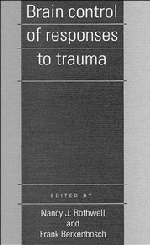Book contents
- Frontmatter
- Contents
- Contributors
- 1 Introduction
- 2 Responses to injury
- 3 Experimental approaches to the central nervous system control of responses to trauma
- 4 Neurohormonal control of cytokines during injury
- 5 Brain regions involved in modulation of immune responses
- 6 Psychological and neurobiological consequences of trauma
- 7 Central nervous system control of sickness behavior
- 8 Psychological and behavioural aspects of pain
- 9 Central control of cardiovascular responses to injury
- 10 Neuroendocrine responses to physical trauma
- 11 Central control of metabolic and thermoregulatory responses to injury
- 12 Central control of pain
- 13 The final word …
- Index
3 - Experimental approaches to the central nervous system control of responses to trauma
Published online by Cambridge University Press: 05 August 2016
- Frontmatter
- Contents
- Contributors
- 1 Introduction
- 2 Responses to injury
- 3 Experimental approaches to the central nervous system control of responses to trauma
- 4 Neurohormonal control of cytokines during injury
- 5 Brain regions involved in modulation of immune responses
- 6 Psychological and neurobiological consequences of trauma
- 7 Central nervous system control of sickness behavior
- 8 Psychological and behavioural aspects of pain
- 9 Central control of cardiovascular responses to injury
- 10 Neuroendocrine responses to physical trauma
- 11 Central control of metabolic and thermoregulatory responses to injury
- 12 Central control of pain
- 13 The final word …
- Index
Summary
Introduction
The 1990s has been proclaimed the ‘decade of the brain’, reflecting intense and rapidly expanding research into basic neurosciences and neurological disorders. This development has arisen from fundamental scientific advances in understanding the processes within the brain and the interactions and mechanisms by which the central nervous system (CNS) responds to and controls peripheral systems, and from the increasing prevalence of neurological disorders. Of particular relevance to this book have been the important advances made in the field of neuroimmunology, where multiple, bidirectional communications have been observed between the nervous system and the immune system. Increased awareness of the impact of psychological status on responses to disease and injury, and long-term effects of trauma on subsequent behaviour might further contribute to our basic understanding of clinical management of trauma patients. Unravelling the role of the brain in controlling responses to injury and the complex interactions between the CNS and host defence responses is a daunting but exciting challenge, with enormous potential benefits. Specific aspects of this subject are discussed in detail elsewhere in this book. However, in this chapter we attempt to introduce the experimental approaches available for studying CNS control of responses to trauma, and to consider their relative advantages and associated ethical, logistic and scientific drawbacks and limitations.
Problems of research into trauma
Ideally, scientific research is based on experimental testing of defined hypotheses. However, even in controlled animal or cellular systems this ideal is often difficult to achieve, and studies on normal humans or onpatients present more serious and often insurmountable problems. Biological research has moved towards more reductionist approaches where studies on isolated cell systems and molecular mechanisms can provide definitive answers and clearly defined experimental systems. However, for many problems in biological and clinical research, of which the present topic is an excellent example, a more integrated approach is necessary, since numerous cells, organs and physiological systems are involved. Research on patients has provided many important data that may relate directly to underlying mechanisms of pathology and can lead to novel treatments. However, this is usually descriptive, since any interventions must be considered in the context of overriding clinical priorities and the well-being of the patient. Data derived from patients also suffer from diversity of the extent of injury, the time of onset, concurrent therapies and variations on the normal physiology (e.g. age, sex, underlying pathological considerations).
- Type
- Chapter
- Information
- Brain Control of Responses to Trauma , pp. 22 - 31Publisher: Cambridge University PressPrint publication year: 1994



